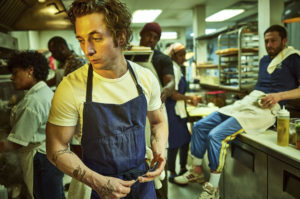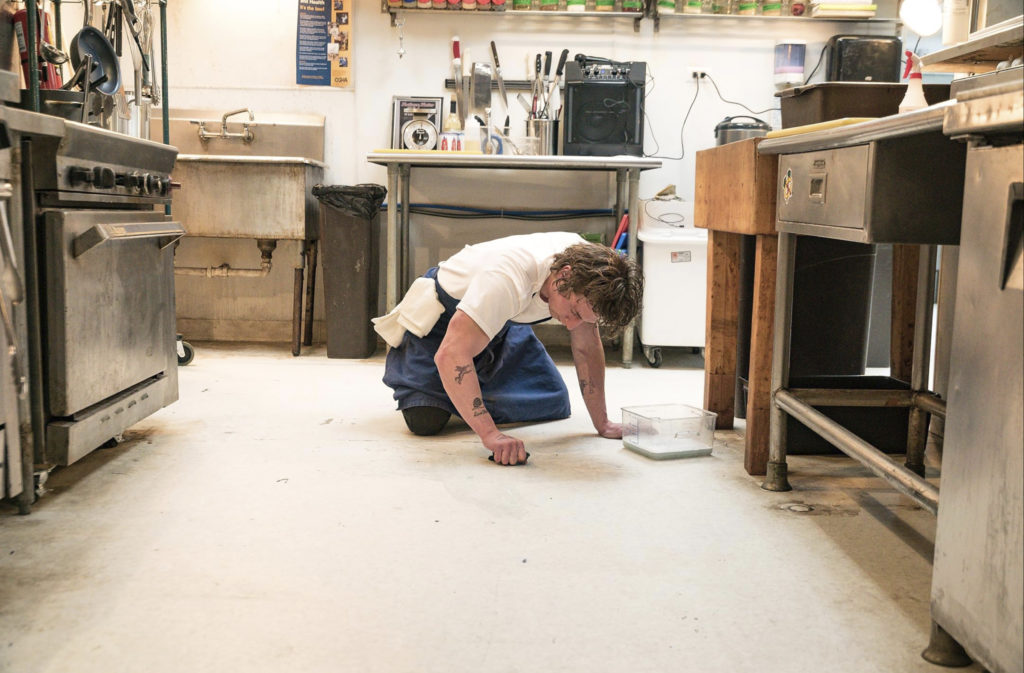Is it possible to create great art without being dysfunctional, a terrible person, or both? Received wisdom says no, proposing that life for and especially with creative types is inevitably, well, dramatic.
It’s a generalization, but consider the source of the creative drive and the creative process: a talent, vision attuned to beauty, truth and so on, but then there’s also the pride, competitiveness, attention-seeking, affirmation-yearning, trauma, and all the rest.
And the creative process? It’s usually mostly awful, painful, and frustrating: ever falling short, never adequately expressing what’s in your head, whether the material is sound or words, paint or stone.
Or food. And this, I’ve decided, is what “The Bear” (streaming on FX/Hulu) is all about.
Oh, you thought it was about the restaurant business? Well, sure it is, complete with celebrity chef cast members (Matty Matheson) and cameos (Thomas Keller, Daniel Boulud), but just as we don’t watch “The Sopranos” to learn about the workings of the Jersey mob, “The Bear” may attract us by the menu, but what keeps us coming back are the people.
The people and their problems, that is. And to circle back to my opener, the central problem the people in “The Bear” grapple with is, in essence: We know you’re crazy creative, love that for you, but is being a jerk really necessary to your process, chef?
To catch up: “The Bear,” created by Christopher Storer, stars Jeremy Allen White as Carmen — aka Carmy — Berzatto. Through the first two seasons, we’ve followed Carmy, a young, nationally well-regarded chef, returning to his hometown of Chicago to tend to the family’s Italian beefsteak-centric diner left floundering after his brother’s suicide. It’s a troubled place, and Carmy’s troubled: family trauma, including alcoholism and addiction, that suicide, insecurity, and the conflict between his duty to his family’s business and his creative vision all batter his psyche.

In this he’s not alone, and as we get to know the other characters — Sydney (Ayo Edebiri), the young female chef with vision and aspirations of her own, “cousin” Richie (Ebon Moss-Bachrach), Carmy’s second-in-command, Carmy’s sister Natalie (Abby Elliot), sous chef Tina (Liza Colón-Zayas) and pastry chef Marcus (Lionel Boyce) — we witness the widening, positive impact of Carmy’s talent and vision, yes, but also the toxicity of his internal drama.
“The Bear” is an intriguing, imperfect, probably overrated, and sometimes frustrating show. It has the feel of “contracted for ten episodes with solid material for six, tops.” There are too many beats and scenes held for just long enough for meditative character exploration to drift into tedious, affected indulgence and a few entire episodes that would have worked just fine shrunk to a single scene.
This third season of “The Bear” has been met with some disappointment. Food — actual food — is definitely in the background here, and there’s some weariness around “oh, there’s tormented Carmy mewing, tweezing tiny pieces of food, then yelling.” We get it! Carmy hurts! And he’s taking it out on everyone around him!
I initially shared that disappointment, but by the end — despite being annoyed at least once per episode — I was back on board, simply because I appreciate the show’s exploration of the relationship between creator, creation, and community.
Carmy’s a brilliant, promising chef, but as the season-opening episode-length montage — of him endlessly arranging peas and rosemary buds, haunted by memories of mentors villainous and virtuous, screaming family members and his angel ex-girlfriend — clearly shows is that at this point, it’s all about him. His kitchen art is all about working out his trauma, he’s on a quest for that Michelin star, and it’s his star.
In this creative quest, he’s built his team and they’ve grown too, discovering and nurturing their own gifts. But they’ve also been exploited and abused.
He’s determined to bring his unique vision to the table. But this particular table stands in a place built by others out of a tradition in a particular community, all of which he’s ignoring, as if the only way to heal is to amputate.
Carmy may be an intense, gifted creator, but his drive is insular, self-referential, and ultimately a work of alienation, not communion.
We’ve seen all this, yes. But this season, we’re also seeing glimpses of another way. The only part of the business that’s profitable or bringing anyone a hint of joy is the old, ordinary lunchtime sandwich trade. We’ve seen a striking montage of Chicago-area tradespeople and workers doing their thing, proudly making, creating, giving, sharing. And in the season finale, we’ve heard, at a “funeral dinner” for another high-end restaurant that’s closing, this:
“We can give them the grace, if only for a few hours, to forget about their most difficult moments. Like, we can make the world a nicer place. All of us in this room.”
Art emerges from an artist’s psyche and experience, and is shaped by his gifts. But if that’s all it reflects, it’s abstract, indulgent, and insular. Meaningful creative work is certainly an act of self-expression, but it hits differently, depending on who that “self” is — atomized and alone or in communion with who’s around and what’s above.
Made in the Creator’s image, we all create, every day, making something new out of the stuff of our lives. Can we do that hard, beautiful thing, “The Bear” prompts us to wonder — all of us in this room — in a way that builds and heals, not only our own woundedness, but serves grace to others?

